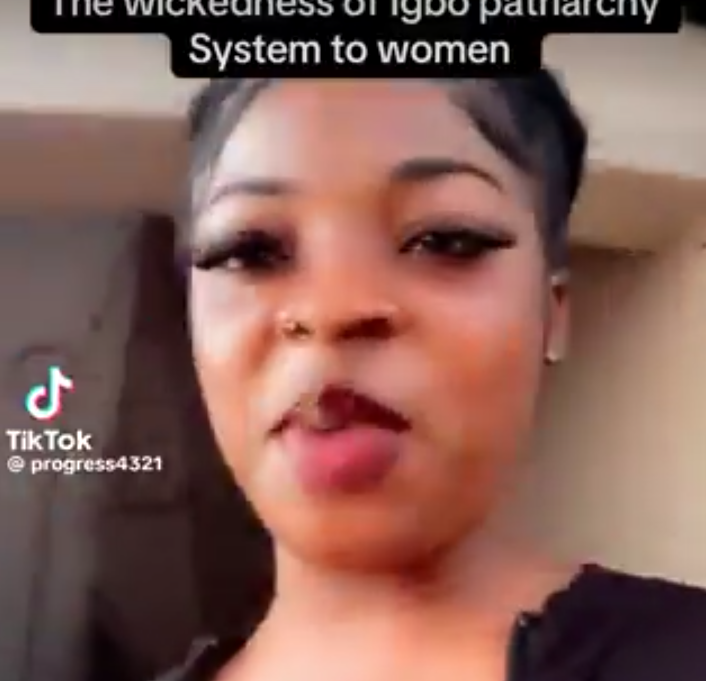
“I’d Rather Marry a Foreigner Than an Igbo Man” — Lady Sparks Debate as She Condemns Deep-Rooted Patriarchy in Igbo Culture

A young Nigerian woman has set social media ablaze after expressing her firm decision never to marry an Igbo man, citing the entrenched patriarchal traditions within Igbo culture as her main reason. In her words, “Igbo patriarchy is very wicked. As an Igbo girl, I’ll never marry an Igbo man. As an Igbo woman, everything I work for is automatically my husband’s if I marry an Igbo man, and if I don’t have a child for him, it’s worse. If my father kpa! only his sons will inherit his properties.” The emotionally charged statement has ignited fierce arguments across the internet, reviving age-old discussions about gender, inheritance, and marriage traditions among the Igbo people.
The unnamed lady, whose post has since gone viral on X (formerly Twitter), expressed deep frustration over what she described as “a system designed to silence women and glorify men.” Her outburst touched a nerve among both men and women, particularly from the southeastern part of Nigeria, where cultural practices and gender expectations often clash with modern realities. While some users hailed her for courageously speaking out against patriarchal oppression, others slammed her for “publicly shaming her heritage” and generalizing an entire ethnic group based on cultural practices that are, according to them, “fast fading away.”
In a series of follow-up posts, the lady elaborated on her claims, saying that growing up in an Igbo household made her realize that a woman’s worth is often tied to her ability to bear children — preferably male children. She lamented that despite women’s growing achievements in education, business, and politics, traditional norms still dictate that men hold ultimate authority in family and inheritance matters. “I’ve seen my aunties cry after building houses with their husbands only to be sent away after his death because they had no sons. I’ve seen my cousin’s mother denied access to her husband’s property even after contributing financially. So, no, I will never put myself through that pain,” she wrote.
Her words opened a floodgate of mixed emotions. Many young women from the southeast resonated with her sentiments, sharing personal stories of similar experiences. One user commented, “I’m from Anambra, and my late mom’s property was seized by her in-laws because she had only daughters. Till today, it still hurts.” Another wrote, “People won’t understand until they see how widows are treated like strangers in their own homes. Our culture needs serious reformation.”
However, not everyone agreed with her. Some Igbo men accused her of exaggerating the issue and failing to recognize the progress already made in many modern Igbo families. “Not all Igbo families are like that anymore. My dad’s properties are in my mum’s name and my sisters have equal rights to inherit,” one user argued. Another man wrote, “Every culture has flaws. Don’t use isolated experiences to condemn the entire Igbo race. Patriarchy exists everywhere, not just among the Igbos.”
Cultural observers, however, admit that while modernization has softened many traditional practices, the root of Igbo patriarchy remains deeply ingrained in social structures. In many communities, inheritance laws are still governed by customary norms that favor male heirs. Women, even after decades of advocating for equal rights, still find themselves excluded from property ownership within their paternal homes. According to sections of Igbo customary law, inheritance is typically patrilineal — meaning only male children have the right to inherit their father’s estate. Daughters are expected to marry out and “belong” to their husband’s lineage, while widows often depend on the goodwill of their in-laws for sustenance and accommodation.
Legal experts have, over time, challenged these customs. In fact, a landmark Supreme Court ruling in Ukeje v. Ukeje (2014) declared that denying female children the right to inherit from their father’s estate violates the Nigerian Constitution. But despite such legal progress, social change remains slow, as many families continue to practice the old ways in the name of tradition.
Sociologists have also noted that the clash between culture and modernity is most evident among educated young women who now demand autonomy and equality in marriage. The viral post, they say, reflects the growing frustration among women who feel trapped between preserving cultural identity and embracing personal freedom. “We are witnessing a generational shift,” says Dr. Chioma Okeke, a sociologist at the University of Nigeria, Nsukka. “Younger Igbo women are more vocal, more educated, and more exposed to global gender norms. They are no longer willing to stay silent under oppressive customs. What used to be whispered within family circles is now being shouted on social media.”
Her observation seems true, as online debates around gender and tradition have become increasingly heated in recent years. Platforms like X and TikTok have become battlegrounds for cultural reform, with women boldly questioning long-standing practices such as bride price, widowhood rites, and inheritance discrimination. Some argue that these customs were created in a different era and no longer serve the realities of today’s society.
Nevertheless, defenders of Igbo culture maintain that outsiders — and even some young Igbo people — misinterpret the essence of tradition. According to them, Igbo customs were originally rooted in social balance and communal continuity, not in the subjugation of women. “Our forefathers believed inheritance should remain within the family lineage to preserve identity and heritage,” said one elder in a radio discussion reacting to the viral post. “The problem is not culture itself, but how people have twisted it for selfish reasons. A good man will never oppress his wife or daughters because of tradition.”
But for many women like the lady whose post started this debate, such justifications no longer hold water. She insists that respect for culture should not come at the expense of women’s dignity or financial security. “You can’t tell me to stay in a system that sees me as less than my brother,” she wrote in another post. “If loving my culture means losing my rights as a woman, then I’ll choose freedom every time.”
Her bold stance continues to divide opinions, but it has undeniably forced a difficult conversation about what it truly means to be an Igbo woman in the 21st century. As more voices join the discussion, one thing becomes clear — the tension between tradition and equality is not just an Igbo problem, but a Nigerian one. Across different ethnic groups, women are rising to question customs that deny them full participation in family, economic, and social life.
Whether or not the young lady’s decision to reject Igbo men as potential partners is justified, her statement has spotlighted an uncomfortable truth: cultural evolution is inevitable, and the younger generation is demanding change. What started as a frustrated rant on social media has become a mirror reflecting the deep cracks in the foundation of gender relations within Nigerian society. And as the conversation grows louder, one can only hope that it leads not to more division, but to genuine dialogue and reform — where love, fairness, and respect finally triumph over outdated traditions.
“Igbo patriarchy is very w!cked. As a Igbo girl I'll never marry a Igbo man. As an Igbo woman everything I work for is automatically my husband's if I marry an Igbo man and if I don’t have a child for him, it’s worse. If my father kpa! only his sons will inherit his properties."… pic.twitter.com/vQSBL2XdbW
— Oyindamola🙄 (@dammiedammie35) October 22, 2025


